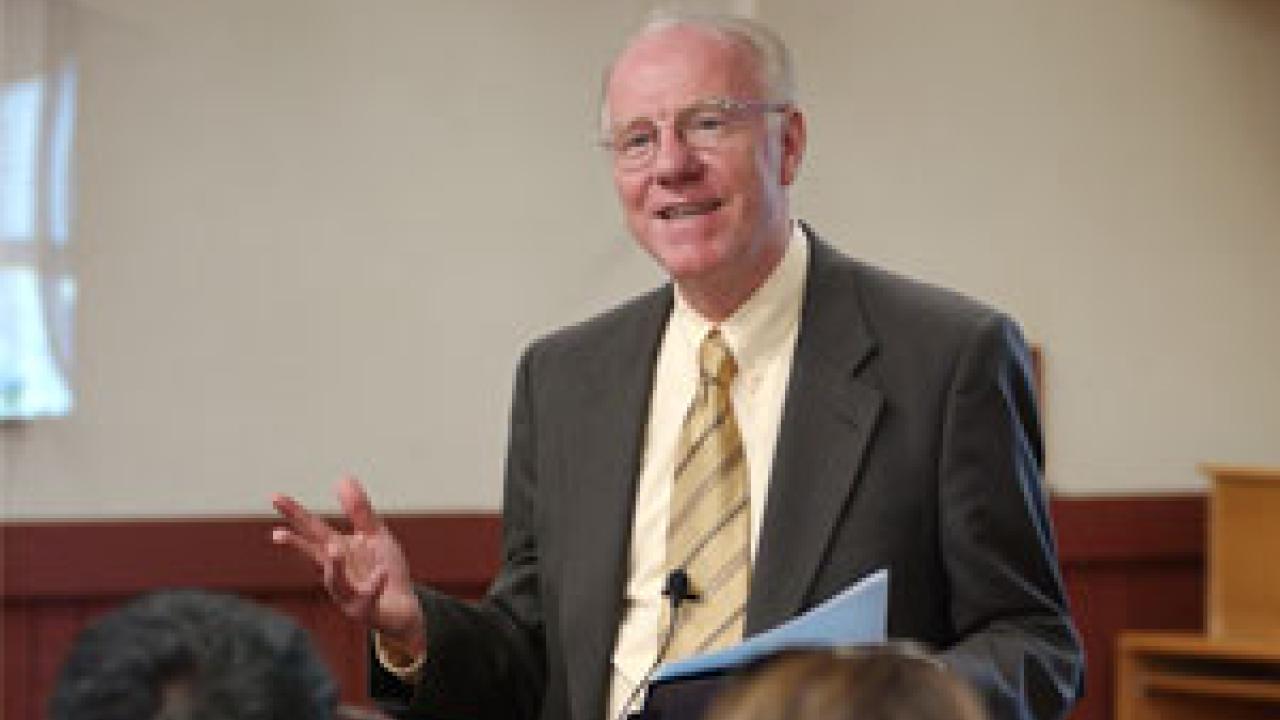Chancellor Larry Vanderhoef said the university found itself "in the headlines" in recent weeks on topics like union strikes and stem cell research.
Speaking to an audience of about 50 campus community members at a Brown Bag session Monday, Vanderhoef touched on a range of issues, including the recent union strike, salaries, student fee increases, international student admissions and the possibility of Sacramento serving as the capital of the stem cell research effort.
Held in the Silo Cabernet room, the event was billed as a chance "to come together and to ask questions," said Vanderhoef. He will continue to hold the dialogue opportunities for the "foreseeable future."
The chancellor noted the recent one-day UC-wide strike on April 14 by some service workers. Since then an agreement between the union and the UC has been reached, and the union members are set to vote on the agreement in the next few weeks. (See story below.)
The American Federation of State, County and Municipal Employees Local 3299, representing 7,300 UC service workers, organized the strike.
"I'm delighted things were respectful here on campus," Vanderhoef said, "and that we didn't have a problem. It was important for the union to voice" its perspective on the labor issues at hand.
The strike caused minimal disruptions in services on campus. Still, Vanderhoef said, it is difficult for individual campuses to handle strikes because the UC Office of the President negotiates the contracts with the various UC unions. This leaves little recourse at the campus level in such affairs, he added.
Stem cell competition
Vanderhoef noted that UC Davis is working with the city of Sacramento in a highly visible bid to host the administrative headquarters for the statewide stem cell research effort.
Sacramento is one of four finalists for the coveted headquarters of the state's new stem cell research agency but faces stiff competition from three cities with larger biomedical employment: San Francisco, San Diego and Emeryville.
In a preliminary evaluation released two weeks ago, San Francisco ranked first and Sacramento second in the competition to host the $3 billion embryonic stem cell research program voters approved in November. A site decision may be announced in a few weeks.
"There are lots of reasons that UC Davis would benefit from having the headquarters," Vanderhoef said, "and it is true that the headquarters would benefit from being in Sacramento and near the state capitol."
On employee salary increases, the chancellor said the campus is in the fifth year of constrained finances, though the future looks somewhat brighter due to the state budget compact that calls for slight salary increases in upcoming years.
"It'll change, but it won't change a whole lot," he said about the possibility of salary increases.
Student fees are another concern, Vanderhoef said. The cost of attending the university has increased dramatically in recent years for students in undergraduate, graduate and professional programs. For instance, it is now almost as expensive to attend UC Davis' law school program as it is for a private university law program.
Again, he said, the uptick in student fees is expected to slow.
"There will be fee increases in the future," Vanderhoef said, "but they will be more predictable."
Finally, the chancellor expressed support for foreign students who face difficulties in admissions due to homeland security regulations put in place since 9/11. "These students are very important to us," he said.
Media Resources
Clifton B. Parker, Dateline, (530) 752-1932, cparker@ucdavis.edu
